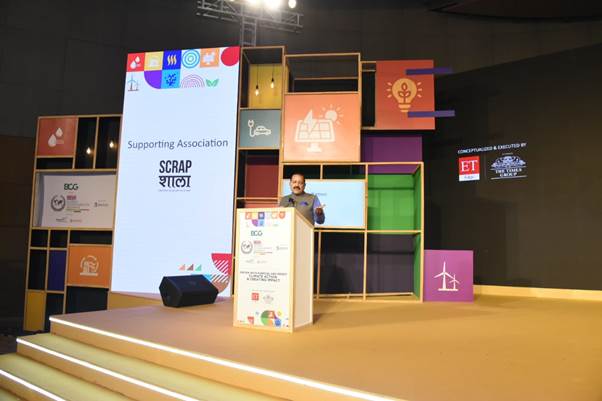Union Minister of State (Independent Charge) for Science & Technology, Dr. Jitendra Singh has said that there is an urgent need for decisive action to combat climate change, a challenge that is no longer a distant threat but an immediate reality affecting lives, economies, and the future of the planet. He was addressing the Times Now Global Sustainability Alliance’s 6th edition of the SDG Summit 2024 in New Delhi today. The theme for the address was Game Changing India’s Science Based Targets for Climate Change.

Recognizing India’s responsibility as one of the world’s fastest-growing economies, Dr. Singh reaffirmed the country’s commitment to balancing sustainable development with global climate change mitigation efforts. He highlighted the importance of science-based targets, which, in alignment with the goals of the Paris Agreement, aim to limit global warming to well below 2 degrees Celsius, with aspirations to restrict it to 1.5 degrees.
He outlined India’s key climate targets, which include:
A reduction of 33-35% in greenhouse gas emissions intensity by 2030, using 2005 levels as a baseline.
A commitment to increasing non-fossil fuel energy capacity to 500 GW.
An ambitious goal to achieve net-zero emissions by 2070.
The Minister of State underscored the importance of collaboration in achieving these targets, urging stronger partnerships between government, industry, academia, and civil society. He highlighted that innovation will be central to India’s strategy, whether through advancements in renewable energy, sustainable agriculture, or green technologies. The government is committed to supporting research and development to drive these innovations under Prime Minister Narendra Modi’s leadership.

Dr. Singh pointed to the robust policy framework established by the Government of India to guide climate action, with the National Action Plan on Climate Change (NAPCC) playing a pivotal role. The NAPCC, launched in 2008, comprises eight key missions that address various aspects of climate adaptation and mitigation:
1. National Solar Mission: Aims to promote solar energy technologies and achieve 100 GW of solar power capacity by 2022.
2. National Wind Energy Mission: Focuses on expanding wind energy capacity and encouraging innovation in wind technology.
3. National Mission for Energy Efficiency: Seeks to enhance energy efficiency through programs such as the Perform, Achieve and Trade (PAT) scheme.
4. National Mission on Sustainable Habitat: Aims to promote energy efficiency in buildings, urban planning, and waste management.
5. National Water Mission: Focuses on water conservation and equitable distribution, addressing the impacts of climate change on water resources.
6. National Mission for Sustaining the Himalayan Ecosystem: Works to protect the fragile Himalayan ecosystem through research and monitoring.
7. National Mission on Agricultural Adaptation: Aims to build resilience in agriculture by promoting sustainable practices and crop diversification.
8. National Mission on Green India: Seeks to increase forest cover, restore degraded ecosystems, and enhance ecosystem services.

Moreover, He emphasized that India has developed various sector-specific strategies to strengthen its climate goals. These goals include:
Energy Sector: Investments in renewable energy sources like solar, wind, and biomass, alongside the implementation of smart grids and energy storage.
Transportation: Promotion of electric vehicles (EVs) and enhancement of public transportation systems.
Agriculture: Focus on climate-resilient crops, improved irrigation, and sustainable farming practices.
Urban Development: Encouragement of sustainable urban planning, green building practices, and waste management initiatives.
Water Resources: Promotion of water conservation, rainwater harvesting, and enhanced river basin management.
Disaster Management: Strengthening resilience against climate-induced disasters through improved early warning systems and community preparedness.
Dr. Singh urged every citizen to actively participate in the fight against climate change, emphasizing that simple changes in daily life can have a significant impact. He stressed the importance of fostering a culture of sustainability and urged all stakeholders to collaborate towards a resilient and sustainable future.
He congratulated the organisers and wished success to the event.

Comments are closed.